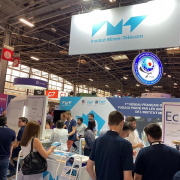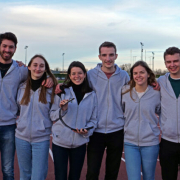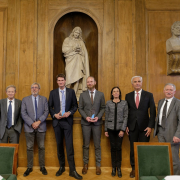RFID and Responsible Innovation
IMT invites you to a conference-debate
Friday 14 March, 9:30-17:30
Télécom Paris – 46 rue Barrault – Paris 13th
Télécom Paris, the Observatory for responsible innovation and the Interdisciplinary Institute on Innovation (i3) have scheduled a conference and debate day for Friday 14th March on the subject of “RFID: an evaluation of its impact on privacy, management of human exposure, eco-design and recycling; which opportunities should be seized and what requirements are necessary for a responsible approach to innovation?”. The aim will be to stimulate collective brain storming and come up with plans for future development.
RFID is already part of our everyday lives.
Although unseen, RFID (Radio-Frequency IDentification)* technology is already part of everyday life: numerous uses are currently widespread amongst the general public (access control, electronic toll systems, contactless payment, public transport, uses in hospitals, libraries etc.). Radio-Frequency Identification is part of a new wave of technology that incorporates data-transmitting objects and environments, developed to provide access to information on anything anywhere. It identifies, authenticates, locates, tracks both people and objects, automates, increases the security of certain processes and, most recently, models behavior and generates statistical forecasts.
However, the way it works and its aim of facilitating tracking has thrown this complex technology into the heart of emerging scientific and socio-political disputes. While invasion of privacy and potential misuse of data are cause for concern on the one hand, on the other hand questions are raised about the electromagnetic fields’ effects on health, especially in the case of employees working in conditions of prolonged exposure or, eventually, of the general public’s frequent exposure following an increase in the number of readers. Recently, new issues have also emerged concerning the environmental impact of the spread of RFID technology: at a future time when, thanks to cyberspace, M2M communication and wearable computers, everything will be ‘tagged’ by billions of RFID tags, how will their production and end-of-life disposal be managed? These are issues worth considering, given that RFID tags contain not only silicon, but also copper, silver, solvents, glues and plastics.
Debates, discussions and conferences on this subject are becoming ever more frequent, but it must be noted that these tend to deal with the economic and technical questions without properly considering the societal implications of this new wave of technology.
“A thoughtful approach is crucial to allow responsible innovation”
According to Laura Draetta, sociologist at Télécom Paris and the event’s co-organizer, “between managing the risk of invasion of privacy, unknown effects on health and the environmental impact, a thoughtful approach is now crucial in order to identify the opportunities for and requirements of responsible innovation in this field. IMT’s researchers are looking at these questions, as much within the field of engineering-related science as in the field of human and social sciences. IT experts, electronic engineers, sociologists, legal experts and philosophers are carrying out research programs aiming to understand and predict the societal implications of these new technological developments, and to propose responsible innovation plans in order to transform the relationship between technology, society and the environment.”
The conference day** on 14th March, organised by Télécom Paris, will include speakers from the political sphere, public administration, industry and civil society as well as researchers (engineers, doctors, human and social scientists). They will discuss the connection between RFID and responsible innovation and will engage with the audience in order to come up with points to be considered and ways to move forward to ensure responsible innovation in an emerging field of technology within today’s society.
RFID and Responsible Innovation
Friday 14 March 2014, from 9:30 to 17:30
at Télécom Paris, 46 rue Barrault, Paris 13th
Click here to view the full program and the list of speakers
With the participation of: Alain Anglade (ADEME), José Cambou (France Nature Environnement), Pierre-Antoine Chardel (IMT), Denis Cheissoux (France Inter), Geoffrey Delcroix (CNIL), Olivier Desbiey (CNIL), Nicole Dewandre (Commission Européenne), Laura Draetta (Télécom Paris), Jim Dratwa (Commission Européenne), Jean-Marc Galan (CNRS), Jean-Gabriel Ganascia (Université Pierre-et-Marie-Curie), Catherine Gouhier (CRIIREM), Denis Guibard (Orange), Pierre-Benoît Joly (IFRIS), Jacques-François Marchandise (FING), Nathalie Mitton (INRIA), Francesca Musiani (Mines ParisTech), Federico Neresini (Université de Padoue), Dominique Paret (consultant expert), Norberto Patrignani (Ecole Polytechnique de Turin), Etienne Perret (Institut Polytechnique de Grenoble), Marie-Charlotte Roques-Bonnet (CNIL), Alfred Rosales (FEDEREC), Olivier Rouxel (DGCIS), Danielle Salomon (Sciences Po), Patrick Staebler (consultant expert), Dominique Tessier (consultant ICT strategies), Claude Tetelin (CNRFID), Joe Wiart (WHIST Lab).
* RFID consists of a tag containing an electronic chip for transmitting information and an antenna, and a reader that reads data stored on the chip remotely and without contact, through the transmission of radio signals.
** With the support of the DIM IS2-IT (Ile-de-France) and IMT, the conference has been organized by the Observatory for responsible innovation, a think tank on ethical issues within innovation founded in 2011 at Mines ParisTech and forming part of the Interdisciplinary institute on innovation (i3).

























